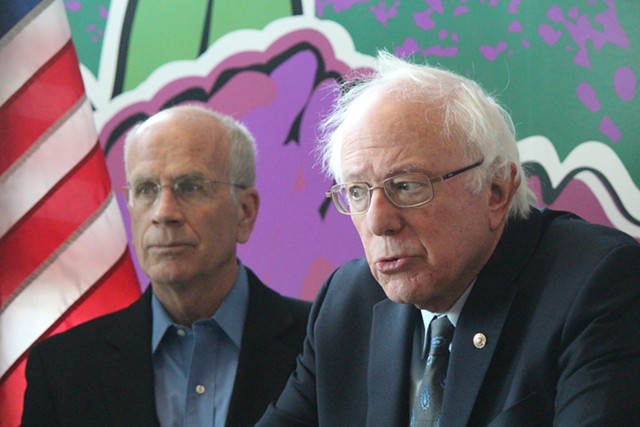
- File
- Rep. Peter Welch and Sen. Bernie Sanders
Updated February 29 at 6:43 p.m.
If Sen. Bernie Sanders (I-Vt.) continues to outperform a crowded field of presidential rivals, he could show up at this summer's Democratic National Convention with a plurality of delegates — but not the majority he needs to claim the party's nomination.
That's prompted some nervous Democrats to consider how they might deny him the nomination and install an alternative, even if he's favored by more voters.
In interviews with 93 party officials this week, the
New York Times found that many of them would be "willing to risk intraparty damage" to stop Sanders at the convention.
Several top Vermont Democrats, however, think that would be a bad idea.
"You know, we've got to keep our eye on the prize here, and the prize is beating Donald Trump," U.S. Rep. Peter Welch (D-Vt.) told
Seven Days. "If a candidate, including Bernie, clearly demonstrates the broadest support in the primary and then the convention outcome is different, I think that would be a challenge ... for our success in November."
Said state Rep. Mary Sullivan (D-Burlington): "I think it would be a big mistake."
Welch and Sullivan are among Vermont's eight "automatic" delegates to the convention — or "superdelegates," as they are more commonly known. The eight include Vermont's three members of Congress — Sanders, Welch and Sen. Patrick Leahy (D-Vt.) — as well as former governor Howard Dean because he served as chair of the Democratic National Committee. They also include state party chair Terje Anderson, vice chair Tess Taylor and Vermont's two representatives to the Democratic National Committee: Sullivan and former state representative Tim Jerman.
To date, four Vermont superdelegates have publicly endorsed their home-state senator: Sullivan, Welch, Leahy and Sanders himself. The rest have yet to make up their mind, though Jerman said he would "probably wind up supporting Bernie."
Citing their roles as party leaders, Anderson and Taylor said they preferred to remain neutral for the time being. Anderson, however, is a longtime Sanders supporter and Taylor said she would likely back the person who won Vermont's primary.
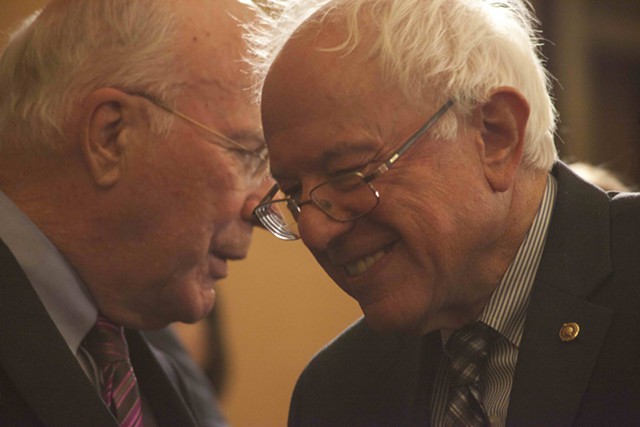
- File: Matthew Thorsen
- Sen. Patrick Leahy and Sen. Bernie Sanders
In addition to the superdelegates, the state also sends 16
pledged delegates to the convention. They are supposed to (but not required to) represent the preference of voters as expressed during next Tuesday's presidential primary in Vermont. Those delegates are chosen at the state party's convention in May and at a follow-up meeting in June.
Due to a rule change orchestrated by Sanders allies after the 2016 election, superdelegates are set to play a diminished role at this summer's convention in Milwaukee. They will no longer be able to participate in the first round of balloting. But if no candidate emerges from the first round with a majority of the 3,979 pledged delegate votes, 771 superdelegates will be able to vote in the second and subsequent rounds of balloting until a candidate attains a majority.
That's when a "stop Sanders" play could take place, with superdelegates coalescing around an alternative to the pledged delegate leader.
According to Jerman, it "could be a disaster to try to derail his candidacy" if Sanders holds a significant lead among pledged delegates. "I'm certainly not gonna join a movement whose only goal is to derail Bernie's candidacy," he said. But, Jerman added, there could be some circumstances in which he would consider defecting. "What if Bernie had another health event?" he asked.
In theory, Taylor said, there are times when it might make sense for superdelegates to diverge from the popular vote. "But in practice, I'd be very careful about how to use that kind of power," she said.
Four years ago, as Sanders was trailing former secretary of state Hillary Clinton in the pledged delegate count, he
argued that superdelegates should hand him the nomination anyway. He has since changed his view. At a Democratic debate last week in Nevada, he said the person with the most pledged delegates should win the nomination no matter what — a position none of his rivals share.
Welch, who endorsed Sanders on the day he joined the race in February 2019, acknowledged that some superdelegates might face a difficult choice — but not him. "I mean, I support Bernie, so it's easy for me," he said. "It's going to be a different decision for lots of other people who don't."
Leahy endorsed Clinton during the 2016 election and
initially suggested he'd give his superdelegate vote to her. His campaign manager, Carolyn Dwyer,
later said he would give it to the winner of Vermont's popular vote: Sanders. This time around, Leahy joined Welch in endorsing their colleague on the day he joined the race.
"Super delegates will not vote unless there is a brokered convention," Dwyer said Thursday in a written response to
Seven Days' questions. "If super delegates do vote, [Leahy] assumes that he will be voting with the entire Vermont delegation, as he did in 2016. Right now he is looking forward to Senator Sanders winning the Vermont Primary on Town Meeting Day."
Dean, who backed Clinton in 2016, said he plans to stay neutral for now, given his leadership role on a DNC project to improve the party's data collection efforts. “I think it’s important for me not to put my thumb on the scale,” he said.
As for how he would vote in a brokered convention? “Speculation is something I try to avoid in public,” he said.










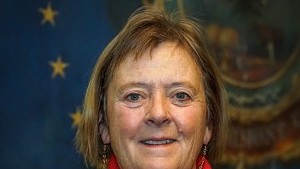
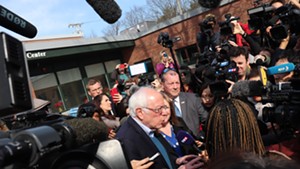
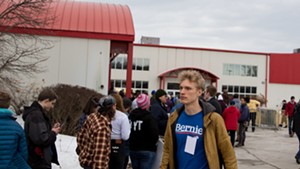

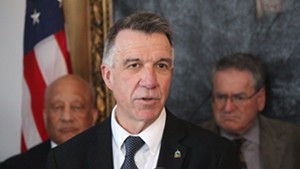



Comments (12)
Showing 1-12 of 12
Comments are closed.
From 2014-2020, Seven Days allowed readers to comment on all stories posted on our website. While we've appreciated the suggestions and insights, right now Seven Days is prioritizing our core mission — producing high-quality, responsible local journalism — over moderating online debates between readers.
To criticize, correct or praise our reporting, please send us a letter to the editor or send us a tip. We’ll check it out and report the results.
Online comments may return when we have better tech tools for managing them. Thanks for reading.